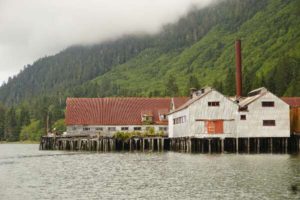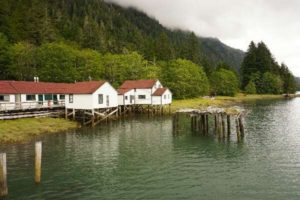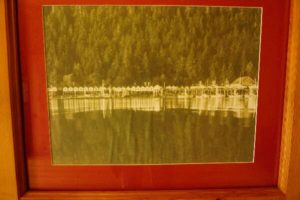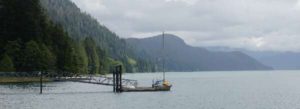Lowe Inlet, Nettle Basin, BC, Canada, 24-AUG-2018 – Yesterday we stopped at a preserved cannery. Yes, there is an irony there.
The cannery is in Inverness Passage, a short drive from Prince Rupert, or about 15 miles by boat, if you don’t go over the shoals, which we do not.
It was another in the series of days of predicted northerly winds that do not show up. It is also the land of the mystifying currents.
We moored the day before at Cow Bay marina, which is the most expensive marina we stay in in our entire travels. It is the only marina that charges by the slip length, rather than the boat length, though we have been comped power. It also has a Canadian customs phone, which makes things easy.
When calling on the phone, the Canadians want you to be on a certified dock. You can’t just call in, as we do with the Americans. At Cow Bay is Robin, the manager whom we’ve gotten to know over the past two years. We’ve also seen him at the Seattle boat show.
This year we’ve also gotten to know Mango.
I was very hesitant to call her Mango. She is a beautiful, thin, young Indo-Canadian woman. It seemed like it might be a slur, when Robin told us to call her that. No, she explained,her given name sounds very similar to Mango and that is the name she was called in high school.
In the spring, she told Jennifer and me a bit of her life story, how her parents met (arranged), what her dad does for living (drives a cab), and lots of other things that rounded out the three dimensional person.
She and I also spoke about working on a large charter boat to make more money than she can working at the marina. She has the inter-personal skills to do well. But, it sometimes feels like drive isn’t what she has.
When we returned, she remembered us, and the conversation about working on charter boats: she referenced it when we spoke about the 140ft charter yacht, Big Fish, on the outside dock.
Mango looked thinner than when we saw her in the spring. It showed in her face, and given she wears leggings, elsewhere.
She starts classes in ‘‘Van’’ on September 4th. One more sign the summer is over.
We rarely see other pleasure boats now. Everyone has headed south. We are among the last. Cow Bay is usually very full and boats are turned away. It was half empty the night we were there. In the office boats post their boat cards. We were pleased to see boats we knew, and I was reminded that I have yet to have a Caro Babbo boat card printed. Holly on Ale-er-Ron showed us their wonderful plastic boat cards when we were in Cow Bay in the spring. These are absolutely what I will order. For a picture, traditionally boat cards have pictures, I’ll use the rear quarter shot at anchor that appears on the CaroBabbo.com rotating gallery.
At the cannery, we tied at the floating dock and watched the members of the most recently completed tour group walk to the roped off dock ramp to look at us.
We walked up the ramp, climbed under the rope and walked to a ‘‘who-dunnit’’ (Jennifer’s term). We look like two people who just walked off a sailboat, if you know what that looks like. A tall, thin, good-looking gray hair man asked where we had just sailed from, and where we were going to. He had no need to ask us if we had come off the sailboat, he knew.
He and his spouse, who had started speaking to Jennifer, had a Crealock 38 – a great name to drop – and had most recently sailed up in 2012. His voyage sounded like ours from 2016, only instead of the man breaking everything, everything that broke had been professionally installed. Surprisingly, he came across a little insecure about his abilities. There was no need.
They keep the boat in Anacortes, where they live. He went out of his way to trash Seattle.
They now have a trailer they tow and visit many of the places they sailed to by land. I agree that it is a great thing to do. And, there are many places that can not be gotten to by boat.
We talked too long, given the time before the current change; we cut the conversation short without introducing ourselves.
To the right was a short string of cabins we wanted to see inside. With his key in his hand, about to unlock one of the cabins, we met Sam. I’m trying to think if this is the first Sam I’ve met where the name was short for Samuel. I’ve known a Jane called Sam, and a Rebecca called Sam, and a Samantha called Sam. Is this my first Samuel called Sam?
Sam had a long gotée with a grown in full beard. His hair and beard were moving to gray. His overalls had modified straps so that they could easily be tightened. He wore a Jets football team baseball cap backwards.
We didn’t know anything about the management of the cannery. Sam immediately told us that the place was mismanaged. He returned multiple times to the closed café. His family owns a Canadian National Historic site, like the cannery, in New Foundland.
The café would have done great, he could run it great. He’d bring in a deep fryer and serve local fish, Salmon, Halibut, Ling Cod. The place would do great. The European tourists are all disappointed to see burgers.
Sam told us he has seven kids, plus the two children of his partner. His family all have large families. Descended from his maternal grandparents are a total of 250 people. He’s just fifty, his oldest is 29. He has one grandchild.
His family runs their historic site so much better. He could run the café so much better.
We all have horizons of different sizes. At the time, we only saw the cannery to Sam’s horizon.
As we walked towards the main buildings a short, professionally cheery woman with a pronounced Canadian accent approached us and said to Jennifer, ‘‘did I speak with you on the phone?’’ It was clear she had come looking for us.
‘‘There is a tour about to start.’’
I distinctly had the feeling she wanted to make sure we paid the museum fee, which includes the tour.
Our tour guide, Kobi – ‘‘spelt the Japanese way’’ – will be a senior at Port Edwards high school this year. He’s tall, attractive and wants to study Civil Engineering. He looks forward to building infrastructure in third-world countries.
Kobi’s knowledge was good, he spoke quickly, finishing each burst of words with a small laugh. His talk and the signage explained the business and the canning process as technology moved forward, until the 1970s, when cleanliness standards changed and it became cheaper to build new canneries than to retrofit old canneries. Technology also made frozen fish more attractive than canned fish.
They had just spent $2 million of the Canadian government’s money refurbishing the wharf.
The published answers and wholesome talk explained away some of what we saw: different areas for different groups of people. The Japanese in one, Chinese in another, native people in a third and Europeans in a fourth.
The inherent and institutional racism didn’t really hit home until another tour leader added the extra sentence when explaining that the mess hall was only for Europeans. I assumed that there were other mess halls for the other groups. We were told they lived separately because of the different languages. (They most likely lived apart because they were contractors, not employees. Each racial group was engaged by a different contracting company.)
The Japanese, before WWII, comprised fifty percent of the work force, but they, like their American counterparts, were shipped off to internment camps until 1949. Part of the standard speech pointed out they were interned no-matter where they were born.
Where did the other groups eat, if they didn’t eat in the Europeans mess hall? Well, they were not supplied any food. Another guide explained to her group: they hunted and had gardens. The groups bartered foods. The Chinese were known for their every excellent gardens.
We motored to the very open Lawson Harbor on Lewis Island, dodging a tug towing a massive barge loaded with hundreds of containers. Lawson Harbor was, to me, rolly. Jennifer slept very soundly, rocked to sleep.
We motored today down Granville Channel. There are no boats. Two boats passed us heading south and one heading north. No one else showed up on AIS.
Around three pm, a power catamaran gained on us over the course of 45 minutes or so. The vessel didn’t show on AIS, which isn’t unusual, especially Canadian vessels.
She was coming up directly behind us, which is a bit unusual, then slowed and moved to port. When she would have started to overtake, she slowed: a very polite thing to do. Then, started to fall behind. I grabbed the 10X binoculars. Police was written across her bow.
Were we about to be boarded?
A RIB appeared along side the catamaran, speeding towards us. One man driving, seated on a motorcycle saddle-style seat, a second, on the bow, had what can only be described as an oversized ticket book in which he was writing.
We waved and slowed as they came along side. The man up front asked us if we’d touched ground in Canada. When we said yes, he said he’d like to check some customs things. Could he come aboard?
I suspect if we’d said we preferred he not come aboard, he would have done everything from his boat.
I was about to undo the life lines when he started to come aboard farther forward onto the forward deck. I told him that was okay, but I was going to drop the cockpit life lines. He immediately stopped struggling to climb on board, told us that would be very good, and came on through the cockpit.
We had a discussion of whether it would be better to stop or keep moving at slow rate. The man in the RIB, hesitated. Jennifer suggested they tie along side. I suggested we keep moving enough so we have steerage. The man in the RIB agreed, and so we did, on auto helm.
I enjoy these things. It is out of the ordinary and I get to ask all sorts of questions. The title of the man on board is Constable, and to our surprise, he knows Chris, the RCMP constable in Uculet. Chris is famous for telling us, when told we had American beer on board, to ‘‘chuck that shit overboard and buy some real [Canadian] beer.’’
Our current constable, Constable Kokesch, laughed at the story. He works seven days on, seven days off. ‘‘A sweet gig.’’
He listed me as operator rather than Jennifer, even though her name is listed first on the documentation. I hazarded that it was because he was speaking with me and had my passport in his hand when he was filing out the form. Jennifer will have none of it.
We have anchored tonight in Lowe Inlet at the foot of a waterfall. But the flow from the waterfall is not enough to keep us facing it. We must leave tomorrow before the low tide to keep from being in unacceptable (to us) shallow water.
Sent from Iridium Mail & Web.





Ok John, I am curious at to what a “pronounced Canadian accent” sounds like. Most of us up here don’t believe we have accents, except for those Canadians from down east or from Quebec, lol !
Shirley,
I would have to give some thought to what a Canadian accent sounds like, terms of being able to describe it… There are some specific word pronunciations, ‘‘about,’’ ‘‘project’’ and like, but those aren’t about accents.
There is a specific cadence and clipping of words that is distinctly Canadian, and a tonal difference from other English speakers.
There is a very much American accent, beyond the regional accents. Everyone on TV speaks with a California accent, which isn’t too noticeable until one moves to California.
There is starting to become a universal (in my opinion) way of speaking English: Hollywood (California) english. I hear it all over the world from people who have learned to speak english from watching television and american movies.
I mourn the disappearing regional accents in the US.
So a pronounced Canadian accent is one that if you heard it anywhere in the world, you would instantly know that person was Canadian.